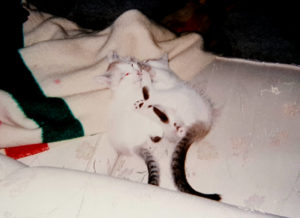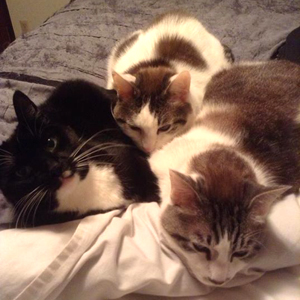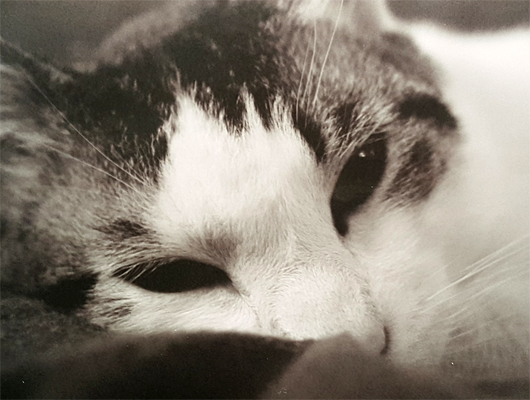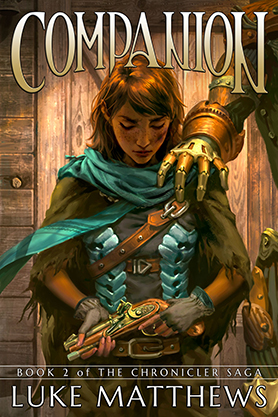This last weekend, I attended my first ever World Science Fiction Convention. WorldCon, as it is known, is a traveling convention that’s been running for over 70 years, and hosts the Hugo Awards, one of genre fictions highest honors.
No, I don’t plan on getting into a debate about that.
Before I start, I’ll preface by stating I had an amazing time at WorldCon. I had loads of fun, met a ton of great people, and had a chance not just to meet, but to actually hang out with and befriend some of my favorite authors. I state this now because I may not be entirely positive about the convention itself in the coming paragraphs.
I’ve been to a decent number of conventions. I don’t go to a ton, but my staples for the last few years have been Emerald City ComiCon and PAX Prime in Seattle. I’ve been to GenCon five times (and can’t wait to get back), and a ton of smaller, regional conventions like NorWesCon, OryCon, SakuraCon, and Stumptown Comics Fest. I even went to a Star Trek convention when I was in high school.
If I were to try and come up with a hierarchy, I’m still not sure where I’d place WorldCon. I’m going to talk a bit about my expectations and disappointments first, mostly because there was so much good stuff this weekend that I’d rather get the negatives out of the way early and end on a positive note.
WorldCon/Sasquan was not a large convention. Someone told me the attendance this year was in the neighborhood of 4000. To put that into perspective, PAX’s attendance runs a little over 70,000, and San Diego ComiCon is almost double that. That was my first major surprise. While I wasn’t expecting PAX or ECCC levels of attendance – certainly not in the tiny convention center in Spokane – I wasn’t expecting the sparseness I encountered at the show. I’m so used to being packed into a convention with all the other sardines that the openness of WorldCon actually made it feel unnervingly empty.
I say “unnervingly” because WorldCon is, ostensibly, one of the largest and most important conventions for genre fiction every year. To see it so empty throws into sharp focus the very core comparison of SFF fandom to other, more pop-culture-y fandoms. Genre fiction is a big business, and yet the nature of its fandom doesn’t lend itself to social gatherings the same way comic books or video games or movies might. The relative size of the convention wasn’t all bad, but I’ll get to the positives a little later.
One of the strangest dynamics at WorldCon, for me, was how much of the floor space – and thought-space – was taken up by the promotion of other conventions. Of course, the primary hawking came from shows vying to host future WorldCons, but there was also a surprising number of other random conventions promoting themselves. Between people trying to get me to vote for their city as host and other small genre conventions desperately begging for my attendance, that part of the show floor began to feel like some weird convention circle-jerk.
I’m sure that this is just standard operating procedure at WorldCon, but it threw me off because you don’t see it as readily at other conventions (although it does happen). Here, it was such a significant and central portion of the show floor that it felt almost oppressive. I’m not sure if that’s an organizational issue, but it felt like the convention-hawking should’ve been made purposely less prominent than the dealer’s area and signature lines, but instead it was the central focus of the show floor.
When it came to organization, WorldCon was… less than stellar, primarily from an information standpoint, at least from a fan’s point of view. The website was downright terrible. While it was very easy to ask questions of the information desk, if information about events or locations hadn’t been poorly or unevenly disseminated in the first place, it wouldn’t have been nearly as necessary. Here’s a prime example:
George R.R. Martin’s signing was capped at 100 people, and they didn’t allow online sign-ups for the event. When we arrived Saturday morning, we heard there were already people in line for the 2pm signing, so we went down to check. There were, in fact, already 40 people in line, and the con staff said people had to stay in line to get into the signing. I had panels I wanted to attend that day, so based on that information I decided I didn’t want to waste my whole day in line.
After missing out on GRRM’s signing, I found out that the line was in fact not capped at 100. The staff (perhaps at GRRM’s direction, but I’m not sure?) capped the line at 100, but once the signing started, they stated that 400 signatures would be allowed, so new people could join and/or recycle through the line. And they never announced this information anywhere else in the convention center. In the end, they never even reached 300 people. So, I could have gone down after a panel I’d attended and stepped right up for a signature without any issue, but because of the (frankly) shitty flow of information and seemingly intentional obfuscation, I didn’t.
The handling of programming at WorldCon was downright strange. In speaking with several authors, I found out that the Sasquan staff determined virtually all of the placement of authors and industry professionals on panels of their own design, with little to no consultation with the professionals themselves. Wesley Chu was placed on a YA panel – having never published any YA books. Several popular genre authors chose not to attend the con at all because they weren’t “given” any programming – Brian McClellan being a prominent example.
This seems so completely backwards to me. At larger shows like PAX, only a portion of the panels and programming are created by the convention. These conventions open up a submission process well in advance where content creators can propose panel topics and guests, then the convention approves and schedules those panels. Professionals have at least some say regarding what panels they participate in. It seems so strange that a convention would not give professionals much, if any, say in what programming they participated in, but also that they wouldn’t give content creators the opportunity to populate the convention with programming.
That being said, I was able to attend some fantastic panels at this show. Panels are not usually a focus for me at conventions, but after I was able to get everything I wanted out of the show floor in my first two hours of attendance, I realized I needed to shift my mindset. I went to several authors’ readings – Elizabeth Bear and Brandon Sanderson among them – but the best panels were the ones involving the more in-depth discussions of the writerly arts.
On Thursday I went to a panel on world-building with Kay Kenyon, Matt Wallace, and Richard Kadrey that helped me immensely with that shift in mindset. Although in depth panels on writing were surprisingly few, it was this panel that made me realize they were there and re-evaluate my schedule of events.
I went to a fantastic recording of the Ditch Diggers podcast, where hosts Matt Wallace and Mur Lafferty ran an adventure, D&D style, asking authors Aliette de Bodard, Linda Nagata, Fonda Lee, and Kate Elliott to brave the Forest of Publishing, then wrapped up with a discussion with editor Lee Harris. I ended up at two other panels with Kate Elliott, one an individual lecture entitled Narrative Structure and Expectation, the other a one-on-one dialogue on world-building between Kate and The Grace of Kings author Ken Liu. Both were absolutely fantastic, and Kate Elliott handled some major technical difficulties at her lecture with WAY more grace than I would’ve been able to muster. My last panel of the convention was entitled Writing About Controversy, with M.J. Locke, Eric Flint, John Scalzi, and Mike Glyer. This was the only one I found only mildly interesting, since they didn’t really delve too deeply into the subject in any way that I wasn’t already familiar with.
Although the panel selection at the convention was a little lacking, in my opinion, I did manage to find some really fun ones to attend, which made my days at the con way better than I was expecting them to be right off the bat.
And, for most of the convention, I completely avoided anything that remotely looked like Hugo controversy. Not in a Neo-dodging-bullets kind of way, but as a boots-on-the-ground attendee, 79% fan and 21% author, it just rarely ever came up. In the grand scheme of attending panels and getting shit signed and hanging out with the community (shout out to the folks at Reddit r/Fantasy, who made my weekend fucking amazing), the worry over Puppy stupidity just never reared its head. It didn’t really seem to have much effect on the convention’s atmosphere.
Speaking of atmosphere (ba-dum-bum): Washington state is in the midst of one of the worst wildfire seasons in history, and even though none of the major fires are directly in Spokane’s vicinity, the sheer volume of smoke that sometimes descended on the town was staggering. On Friday, specifically, there were major air quality warnings. Downtown establishments had warning signs on their doors telling people not to go outside or walk major distances in the smoke which, at one point, was so thick that visibility was only about five or six blocks. It was an exceedingly strange experience, and reminded me a lot of films I’ve seen of downtown Beijing in the midst of their worst pollution seasons.
I ended up being forced to walk about a mile in these conditions (a long story about car troubles that I won’t go into), and I got a brief glimpse at what being a smoker would be like. No thanks.
Anyway, enough about Smo-Con.
On Saturday night I hung out with the aforementioned r/Fantasy crew at Guinan’s (a bar set up at the far front of the hall and named after the Ten Forward bartender from Star Trek: The Next Generation) and watched the livestream of the Hugo Awards with a crowd and a beer (okay four beers). The Awards ceremony itself was unflinching in its comedy about the controversy, and at times gut-bustingly – and unexpectedly – hilarious. Bob Silverberg’s bit had me crying I was laughing so hard. I was worried I was going to be bored by the awards, and that couldn’t have been further from the truth.
But, amidst all of that, the best part of the entire weekend were the evenings after the show floor closed. The very night I showed up, I ended up at dinner with a table of fellow authors that included Jay Swanson, Tim Ward, Jason Gurley, Mike Underwood, and Jason Hough. Jay was the most inquisitive at the table, and all of us had a really lovely discussion that ranged from thoughts on publishing to individual influences to the importance of networking. I’ve been saying for days that it was the best panel I went to all weekend, and I really wish we’d had microphones to record it.
Thursday night was Reddit r/Fantasy’s Drinks With Authors event, a meetup that the organizers were worried was going to be small and poorly attended because the Sasquan staff had expressed complete disinterest in supporting it. Over the course of Wednesday and Thursday both Del Rey and Angry Robot jumped on the hype train, both promoting the event and donating piles of books to the giveaway tables. What originally was going to be a 50 or 60 person event with a couple of authors ended up overflowing the meager space at Black Label Brewing and was attended by authors Megan O’Keefe (who, alongside r/Fantasy moderator Melissa Shumake, ran the entire show), Jason Hough, Wesley Chu, Ramez Naam, Gail Carriger, Kameron Hurley, Kate Elliott, Courtney Schafer, Randy Henderson, Mike Underwood, and Brandon Sanderson. And, hell, I’m sure there are some I’m probably forgetting.
Both nights, after dinner and post-con events, I hung out in different bars and bullshitted (bullshat?) with a bunch of authors and industry folks. This was really my first exposure to the phenomenon known as “BarCon”, a paradigm so common at these sorts of industry events that it has its own name. Oddly enough, it’s something that I’ve always wanted to get out of the larger conventions I’ve attended, and never been able to make happen. Getting people to go out to dinner or a bar after PAX or ECCC has been like pulling teeth, but at WorldCon, all I had to do was show up somewhere and I’d end up in a crowd of fans and industry pros talking about everything from writing to gaming to fashion to drinking.
On Friday night, I was a bit worn out from the frenetic energy of the BarCon atmosphere from the previous two, and ended up having an amazing, relaxing dinner with Melissa from the r/Fantasy table and authors Alberto Yáñez, Courtney Schafer, and Kate Elliott. This, to be honest, is still the highlight of my convention. I tend to enjoy quieter, more relaxing environs for social interaction, so even though it may not have been the best “exposure” in terms of “networking” (two phrases constantly thrown at me when I was debating whether WorldCon would be worth the money), it was by far the most interesting conversation and enjoyable part of my weekend.
We ended up all going our separate ways after dinner, and energized by the conversation I stopped by the bar at the Davenport Grand, the swanky hotel by the convention center that seemed to serve as both the BarCon jump-off point and late-night wind-down. I didn’t immediately see anyone I knew, so I sat down at the bar with a beer. Before long, I met up with Tod McCoy, a board member for Clarion West whom I’d met at a reading a couple of months ago. He invited me up to the Clarion West party, which was one of the few room parties at a convention I’ve ever attended that was genuinely fun. I was one of the last people out the door at almost 1:30am.
Saturday evening, as I mentioned before, was all about the Hugos. That had the effect, for me, of separating out many of the authors I’d been hanging out with all weekend because the after-awards parties were exclusive events, to one degree or another. That’s not at all a bad thing, though, because I spent the entire evening hanging with the crew I’d met from helping with the Reddit r/Fantasy table, and we had an absolute blast. It all started with a steady flow of beer during the Hugo ceremonies, then we ended up at a (sadly mediocre) barbecue joint just talking about the weekend until the wee hours. Melissa, Jodi, and Joel from r/Fantasy were my peeps for the entire weekend, and capping it off by hanging out, laughing, and drinking with them couldn’t have been more perfect.
If I sit down and analyze it, WorldCon was technically a mixed bag of an event. The convention itself ranged from okay to bad, with a few bright spots. What really made the convention interesting and fun was the people, and the after-hours activities. It’s a dynamic I’ve never encountered before, but when I really think back on the weekend, that “mixed bag” just feels like a humongous overall win. If it accomplished nothing else, WorldCon was an excuse to gather publishing industry folks en-masse, which made the weekend extremely fun.
Before, I probably would’ve never thought to travel to Kansas City for MidAmeriCon next year, but man, the allure of BarCon is pretty fucking great.

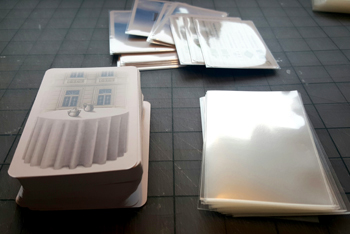 See, I can’t just buy a board game and play it as-is – especially if it includes cards of any type. Thoughts of drink spillage or Cheeto-fingers grubbing up the components… I just… I can’t even. The concept of “mint condition” is so deeply embedded in my psyche that I get the same ragey hind-brain reaction to someone gunking up a game component as I used to when I’d see someone bend a Magic card or break the spine of a book. Though there’s not much I can do to protect a standard game board or punch-out components, if there’s something I can laminate I probably will, and every single card in every single game goes into a sleeve. EVERY ONE.
See, I can’t just buy a board game and play it as-is – especially if it includes cards of any type. Thoughts of drink spillage or Cheeto-fingers grubbing up the components… I just… I can’t even. The concept of “mint condition” is so deeply embedded in my psyche that I get the same ragey hind-brain reaction to someone gunking up a game component as I used to when I’d see someone bend a Magic card or break the spine of a book. Though there’s not much I can do to protect a standard game board or punch-out components, if there’s something I can laminate I probably will, and every single card in every single game goes into a sleeve. EVERY ONE.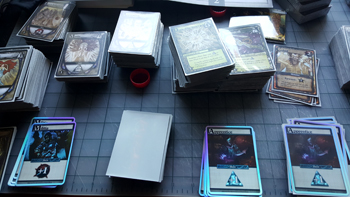 So, I sleeve all my cards. For many gamers, the downside of this is the actual act of putting decks of cards into individual sleeves. It’s not so bad when you’re thinking of a standard deck of cards. 52 cards? Meh. Even a standard M:TG deck is 60, so that’s okay. But what happens when a game has hundreds?
So, I sleeve all my cards. For many gamers, the downside of this is the actual act of putting decks of cards into individual sleeves. It’s not so bad when you’re thinking of a standard deck of cards. 52 cards? Meh. Even a standard M:TG deck is 60, so that’s okay. But what happens when a game has hundreds?  For example, we just picked up a copy of a card/board game called Trains and its expansion Trains: Rising Sun. Between the two boxes, there are over 1,000 cards. One thousand. Games like Dominion might have 300-500 cards in a box and 10+ expansions. That’s a damned lot of cards to sleeve. At last count, I have over 130 games on my shelves, plus expansions, and I’ve sleeved every single card.
For example, we just picked up a copy of a card/board game called Trains and its expansion Trains: Rising Sun. Between the two boxes, there are over 1,000 cards. One thousand. Games like Dominion might have 300-500 cards in a box and 10+ expansions. That’s a damned lot of cards to sleeve. At last count, I have over 130 games on my shelves, plus expansions, and I’ve sleeved every single card.